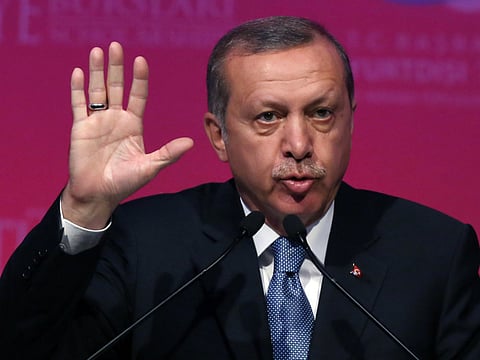What Turkey’s elections say about the Turkish people
The nation’s priorities continue to be the same despite a change in the ruling party’s fortunes as it remains a state of institutions

Turkey is not so different from Arab countries when it comes to economy or politics, except for its support for the Muslim Brotherhood in Egypt and its quest, in coordination with others, to empower the group’s rule.
The Muslim Brotherhood in Egypt had not alienated and did not garner this much hatred among many people in the Arab world. At least not to the extent that it would be placed on the Terrorist List of some Arab and Gulf Cooperation Council (GCC) countries. But that was until they started striving to set Egypt on the wrong course following the revolutions of January 25 in 2011 and June 30 in 2013. The brotherhood also attempted to get in touch with some of their sleeper cells in the region, ordering them to disrupt the political stability of countries and create unrest and thereby pave the way for the Brotherhood to achieve its political objectives.
Perhaps this is the sole reason behind the region’s political stance towards Turkey and the Muslim Brotherhood.
Despite past and current political events, Turkey’s goals are intertwined with those of the other countries in the region whom it is in disagreement with. Turkey is on Syrian President Bashar Al Assad’s list of enemies, because Ankara is striving to bring down the regime and is offering support to the moderate Syrian opposition, agreeing to train them on Turkish soil. Turkey supported and backed Operation Storm of Resolve, which is being carried out by the Saudi-led Arab coalition to restore legitimacy in Yemen.
Turkey also issued statements strongly denouncing Iran’s interference in Yemeni affairs and its backing of Al Houthi militias.
As for non-political dealings between Turkey and the Arab region, particularly the GCC countries, there are many mitigating factors that offer a lifeline and safeguard bilateral relationships. Trade exchange between Turkey and the Arab world reached $45.2 billion (Dh166.24 billion) in 2014 and trade between Turkey and the GCC was around $8 billion in 2013, according to statements by Abdul Rahim Naqi, secretary-general of the Federation of GCC Chambers of Commerce and Industry.
Leaders who have ruled their countries for a long time view democracy as a Trojan horse and think people have short memories. Historically speaking, the British have let down Winston Churchill and the French let down Charles de Gaulle. Both instances are viewed as the norm. People grow tired of an extraordinary leader, because he challenges them to abandon their comfort zone and struggle to make a change. Therefore, an extraordinary leader thinks that ingratitude is a hereditary trait among the public and so a day will come when his voters will not pay any heed to his tremendous achievements, such as the economic miracle overseen by Turkish President Recep Tayyip Erdogan in 2006.
Erdogan is probably thinking “if it was not for that miracle, Turkey would be bankrupt and ruined”.
Erdogan also drastically reduced the influence of the military in politics and prevented judges from carrying out arbitrary practices similar to those implemented by the generals. He did not surrender to the will of the Kurds and jeopardise Turkey’s unity. Contrary to the belief of those who oppose him, he has kept sectarianism in check in Turkey. He has also safeguarded Turkey’s security as storms raged at the country’s borders. No Turkish city has had to suffer like Iraq’s Mosul or Syria’s Aleppo. Under Erdogan’s reign, the Turkish army was not torn apart and did not hastily seek to protect itself by forming a ‘Popular Mobilisation Force’ like in Iraq.
As things stand, Ankara and Istanbul are brimming with investors and tourists, while the unknown shrouds Damascus and fear shrouds Baghdad.
Most of Erdogan’s critics in the media assumed that his party’s loss of a majority in parliament will lead to a radical change in Turkey’s foreign policy towards many issues in the Middle East, such as the Syrian crisis. Some of the coverage was somewhat exaggerated, stating that the Justice and Development Party’s loss will curtail Turkey’s regional role. Some analysts have stated that Erdogan’s rivals were less reckless, instead discussing the effects of the loss and refraining from calling it a ‘political’ coup. However, many newspapers that covered the Turkish elections focused on whether the process was democratic or not, and if so, was the process fraudulent or rigged? The election process was held under the supervision and protection of the interior minister and security officials and therefore, the reportage by these newspapers is not noteworthy.
Turkey’s interests are the same despite a change in the ruling party’s fortunes. Turkey remains a state with strong institutions. Its stance on Al Assad’s regime and those who oppose it will remain unchanged for the sake of Turkey’s regional interests. The only difference is that there will be some sort of balance and it will not side with the Muslim Brotherhood at the expense of others in the Syrian arena.
The Turkish elections showed the Turkish people’s maturity, their understanding of true democracy and that the nation and its domestic and foreign interests come above all else.
Mohammad Hassan Al Harbi is a writer and journalist.
Sign up for the Daily Briefing
Get the latest news and updates straight to your inbox



